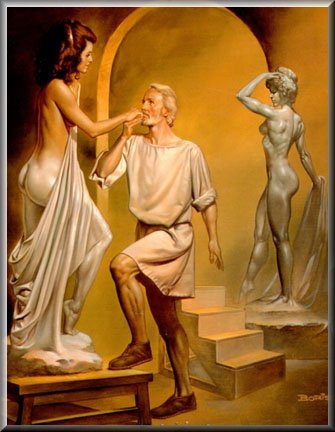-
Recent Posts
Recent Comments
Archives
Categories
Meta
Author Archives: tterehova
Posts: 3 (archived below)
Comments: 2
Pygmalion


So we have a man named Pygmalion who is so disgusted by the women in society that he is ends up making a female statue and falling in love with it. Lucky for him, the goddess of love hears his prays and turns the statue into life. This story kind of reminds of the idea of the price charming. Pygmalion had this idea of his perfect women who he falls in love with. For girls, it the idea of price charming who’s features of course vary from girl to girl, but still its a perfect flawless individual that we shape, much like Pygmalion shaped the girl. While reading the story it occurred to me that nobody asked he girl if she chooses Pygmalion as her husband and what would happen if the statue never turned human or better yet, what would of happened if it accidentally shattered. Although judging from Pygmalion’s actions I think he would of eventually went mad. Never the less, referring to the image, the statue is turning into a woman. I think this this the climax of the story. It image is the exactly correlating with the text but I like it because it captures the transition of going from a statue into a woman.
Posted in Uncategorized
Comments Off on Pygmalion
Medea
After tirelessly scattering the web, in my opinion this is by far the most powerful performance of an already powerful play. As I was reading “Medea” this is exactly how I pictured her, evil laugh and all. Eaten by grief, humiliation and betrayal by her husband, she seeks nothing less then revenge. Although this scene is only a relatively small fragment of the play, it shows Medea’s state of mind and the power that she holds, that even the King Kreon of Corinth of fears her so he bans her into exile. Even if a person just saw this clip and did not know how the story ends, it would come as no surprise to them that a women in such state of mind is capable of murdering her own children.
Most are familiar with a saying “hell hath no fury like a woman scorned”. Well Medea is a ideal example of a woman who’s been scorned. Medea seeks no comfort from anyone. She has no homeland and now she has no family. If we compare the typical women of Corinth to Medea, we see that women are concerned with where Medea will go for her exile, while Medea is too busy trying to decide how best to hurt those that did her wrong.
Posted in Uncategorized
Comments Off on Medea
Gilgamesh

 “hear me, great ones of Uruk, I weep for Enkidu, my friend, bitterly moaning like a woman mourning I weep for my brother, O Enkidu, my brother” (pg. 28). The image shows the low point of Gilgamesh’s life which caused him to go on a journey to find an internal life. Although he obviously failed in that, he did find achieve something much more important. Going off on that journey he was mourning, bitter, proud, and pretty much out of control as a ruler. When he returned he obviously made peace with himself and his fate. Gods gave him an Enkidu who was his equal and then the gods took him away when he became the most dear to Gilgamesh. The unfairness of this might feel very familiar to anyone who ever lost a loved one. The rage, the feeling of how very real death is, and how frightening. Gilgamesh saw death with his very own eyes in the eyes of his beloved brother. Using his immortal strength he tried to defeat death but fortunately, he makes peach with himself as a mortal and gathers wisdom from that as king.
“hear me, great ones of Uruk, I weep for Enkidu, my friend, bitterly moaning like a woman mourning I weep for my brother, O Enkidu, my brother” (pg. 28). The image shows the low point of Gilgamesh’s life which caused him to go on a journey to find an internal life. Although he obviously failed in that, he did find achieve something much more important. Going off on that journey he was mourning, bitter, proud, and pretty much out of control as a ruler. When he returned he obviously made peace with himself and his fate. Gods gave him an Enkidu who was his equal and then the gods took him away when he became the most dear to Gilgamesh. The unfairness of this might feel very familiar to anyone who ever lost a loved one. The rage, the feeling of how very real death is, and how frightening. Gilgamesh saw death with his very own eyes in the eyes of his beloved brother. Using his immortal strength he tried to defeat death but fortunately, he makes peach with himself as a mortal and gathers wisdom from that as king.
The overall story sounds like a balance of power. In the beginning Gilgamesh is corrupt as a ruler so Enkidu is made and he checks his Gilgamesh’s power. After Enkidu dies, Gilgamesh must go on this journey to learn to check his own power and comes back successful. The End.
Posted in Gilgamesh
3 Comments


